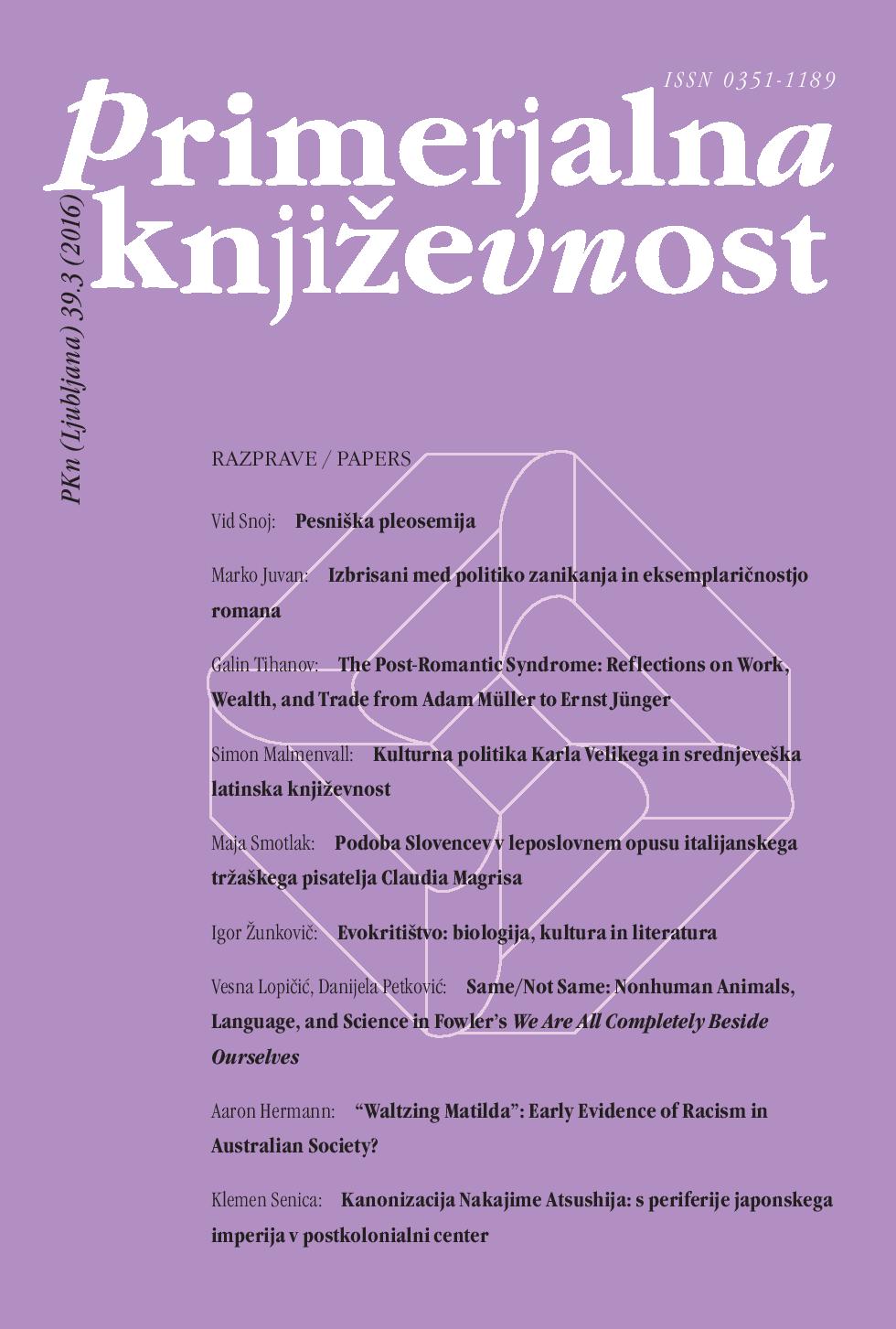Enaki/neenaki: ne-človeške živali, jezik in znanost v romanu Karen Joy Fowler We Are All Completely Beside Ourselves
Ključne besede:
ameriška književnost, človek in žival, odnos do živali, pravice živali, humanizem, antropocentrizem, nasilje, jezik, znanostPovzetek
Članek obravnava roman Karen Joy Fowler We Are All Completely Beside Ourselves (2013) v kontekstu vse glasnejših zahtev po pravicah oziroma osvoboditvi ne-človeških živali (nonhuman animals). Splošna poanta romana se sklada s težnjami aktivizma za pravice živali in kritičnega preiskovanja odnosov med človeškim in živalskim v živalskih študijah. Za razliko od brezkompromisnih živalskih liberacionistov, kot so Gary L. Francione, Tom Regan in Steve Best, Fowlerjeva razvija bolj zapleteno moralno perspektivo zlasti na področju znanstvenih/medicinskih raziskav na živalih, ki jo bolj približa Donni Haraway in Petru Singerju. Čeprav avtorica nikakor ne zanika strahot industrijskega kmetovanja ali biomedicinskih eksperimentov z živalmi, njen roman obenem ostaja tako antropocentričen kot humanističen. V nasprotju s tem, kar ima hitro rastoče polje živalskih študij povedati na temo antropocentrizma in humanizma, v romanu We Are All Completely Beside Ourselves to nista nujno slabi besedi.Literatura
Adams, Richard. The Plague Dogs. New York: Fawcett Crest, 1986.
Armstrong, Philip. “The Gaze of Animals.” Theorizing Animals: Re-Thinking Humanimal Relations. Eds. N. Taylor and T. Signal. Leiden and Boston: Brill, 2011: 175–199.
Bekoff, Marc. The Animal Manifesto: Six Reasons for Expanding Our Compassion Footprint. Novato, CA: New World Library, 2010.
Best, Steve. “The Rise of Critical Animal Studies: Putting Theory into Action and Animal Liberation into Higher Education.” Journal for Critical Animal Studies 7.1 (2009): 9–52.
Bisgould, Lesli. “Power and Irony: One Tortured Cat and Many Twisted Angles to Our Moral Schizophrenia about Animals.” Ed. J. Castricano. Animal Subjects: An Ethical Reader in a Posthuman World. Waterloo, Canada: Wilfrid Laurier University Press, 2008: 259–271.
Burns Gunther, Teresa. “An Interview with Karen Joy Fowler.” Bookslut. Oct. 2013. Web. 27 Feb. 2016. http://www.bookslut.com/features/2013_10_020334.php.
Coetzee, John Maxwell. The Lives of Animals. Princeton, NJ: Princeton University Press, 1999.
Derrida, Jacques. The Animal That Therefore I Am (More to Follow). New York: Fordham University Press: 2008.
Fowler, Karen Joy. We Are All Completely Beside Ourselves. London: Serpent’s Tail, 2014.
Francione, Gary L., and Robert Garner. The Animal Rights Debate: Abolition or Regulation? New York: Columbia University Press, 2010.
Haraway, Donna J. When Species Meet. Minneapolis: University of Minnesota Press, 2008.
“No Mooorreee.” Web. 1 Feb. 2016. http://thebestoftumbling.com/post/127268197129/no-mooorreee.
Knight, Arabella. The Costs and Benefits of Animal Experiments. Houndmills, Basingstoke: Palgrave Macmillan, 2011.
Long, William J., Marc Bekoff, and Rupert Sheldrake. How Animals Talk and Other Pleasant Studies of Birds and Beasts. Rochester, Vermont: Bear & Company, 2005.
Lopičić, Vesna. “Literature and the Discourse of Science: Nino Ricci’s Darwinism.” Eds. Vesna Lopičić and Biljana Mišić Ilić. Jezik, književnost, diskurs: književna istraživanja. Niš: Filozofski fakultet u Nišu, 2015: 387–397.
Maiti, Krishanu. “The Animal That Therefore Derrida Is: Status of Animal in Derridean Posthumanism.” Bhatter College Journal of Multidisciplinary Studies. Special Issue on Animal Studies Volume III, 2013. 11 Dec. 2013. Web. 18 Jan. 2015. http://bcjms.bhattercollege.ac.in/theorizing-the-animal-in-derridean-posthumanism/.
Miller, Alice. The Body Never Lies: The Lingering Effects of Hurtful Parenting. New York: W. W. Norton & Company, 2006.
Van Tuyl, Chris, ed. Zoos and Animal Welfare. Farmington Hills: Greenhaven Press, 2009.
Wolfe, Cary, ed. Zoontologies: The Question of the Animal. Minneapolis: University of Minnesota Press, 2003.


